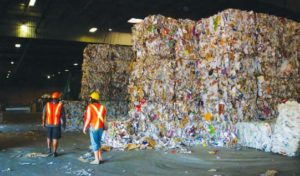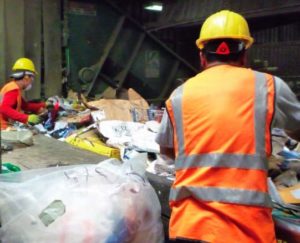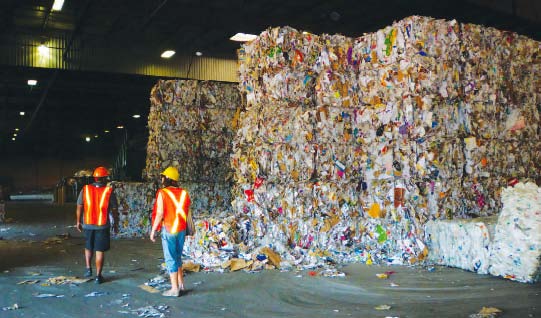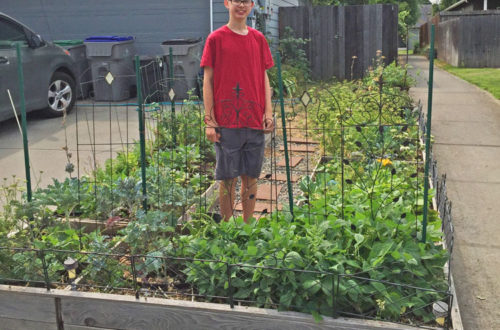The Business of Recycling
Why Recycle?
What is 35 miles wide, 35 miles long, and 300 feet deep? Well, according to an article posted on the Popular Mechanics website on November 13, 2008, that is how big the landfill would be if America put all of its garbage for the next 1000 years in one place. As big as that seems, if it were broken up into thousands of landfills scattered across the entire country it would hardly be noticeable. The fear that we are running out of space for landfills, which was the original impetus for starting recycling programs, is unfounded. So if we are not running out of space for landfills, why bother to recycle and run another fleet of big fuel-guzzling trucks over the same routes that the garbage trucks are already following?
 That question may have been valid for some in 2008, but today it has been replaced with the question: how can we recycle more? And it is not just the environmentalists that are asking how. It is also being asked by companies such as Waste Management, Inc., the nations largest solid waste management company. In a recent article in Waste & Recycling News, they report that Waste Management believes that their waste stream can eventually be mined for an additional $10 billion to $12 billion of annual revenue. Recycling is big business, it is profitable, and it has social relevance.
That question may have been valid for some in 2008, but today it has been replaced with the question: how can we recycle more? And it is not just the environmentalists that are asking how. It is also being asked by companies such as Waste Management, Inc., the nations largest solid waste management company. In a recent article in Waste & Recycling News, they report that Waste Management believes that their waste stream can eventually be mined for an additional $10 billion to $12 billion of annual revenue. Recycling is big business, it is profitable, and it has social relevance.
In fact, the business of recycling could very well be the poster child for the triple bottom line business model: People, Planet, and Profit.
It’s a win-win for everyone. We recycle because:
- it produces profits and attracts investment in new technologies that increase recovery rates,
- it creates jobs and stimulates local economies,
- it reduces the amount of energy needed to produce new products,
- and it reduces the demand on our natural resources.
A Closer Look
The business of recycling is all based on the principle that certain items in  our everyday trash can be collected, separated, compacted, packaged, and then sold as raw material for other industries. In order for the process to be successful, the price received for the processed material has to be greater than the cost of producing it.
our everyday trash can be collected, separated, compacted, packaged, and then sold as raw material for other industries. In order for the process to be successful, the price received for the processed material has to be greater than the cost of producing it.
As we pointed out in our Fall issue (The Mysteries of Recycling Part I), today’s large-scale recycling efforts are in response to drastic changes in products and consumption habits brought on by events and cultural shifts that began in 1941. As a relatively new industry, recycling is still struggling with growing pains and faced with knotty problems.
As an evolving industry, recycling is constantly changing. It is a moving target. This spells confusion for the general public as they try to be conscientious and follow the rules of the day for what they can and cannot put in their curbside container. In order to cut through the confusion surrounding recycling and to better understand the process, we decided to check out a local materials recovery facility or MRF (pronounced “murf”).
An email to Farwest Fibers put us in contact with Vinod Singh, the Operations Manager for the company’s Hillsboro plant, who quickly arranged a tour date for us. Vinod held a brief pre-tour meeting to acquaint us with the company, its safety concerns and rules. Then we donned our hardhats, safety glasses and vests, and started the tour.
When we entered the plant the first impression was utter chaos, with noise, front-end loaders, and a maze of conveyer belts, catwalks, people grabbing and tossing stuff, and piles and piles of what appears to be garbage.
As we proceeded, an order and a sense of flow slowly become apparent. As Vinod expertly explained what was going on, the answer to, “How does it all work?” started to come together.
There are three different sources of recyclables that enter the facility:
- curbside collection from residences,
- bulk collection from businesses,
- outside drop off centers where people deliver and sort their items into separate bins.
The sorting process is different for each of these, and while we were there they were running material from curbside collection. The objective is to separate the incoming trash that has no marketable value into different classes of material such as, ferrous metals, paper, and different types of plastics. The sorting machinery does this by making use of :
- rotating star shaped discs,
- gravity,
- forced air,
- magnets, and
- people.
After being sorted, the trash now has marketable value.
Vinod explained that the machinery has its limitations on what it can, and cannot sort and that there are some items that will actually stop the machinery altogether. This is why only certain items are allowed in the curbside bins and all goes well as long as the public pays attention to what they put in their bin.
Problems occur when material that should not be there, shows up. While we were there, some plastic bags got stuck in the machinery at the very beginning of the process, and brought the entire sorting line to a halt. One of the workers then had to climb into the machine and remove the plastic film that was entangled in the rotating star shaped discs. Meanwhile, the employees on the sorting belts are now idle, which in turn increases the cost of the recovered materials.
After sorting, the separated material is then loaded into a baler where it is compressed, strapped into large bales, and then stockpiled for shipment.
What Can’t Be Recycled and Why?
Such items as plastic bags or other forms of plastic film, hard plastics such as that found in toys, bailing twine, Styrofoam, cooking oil, lids, non-ferrous pots and pans and shoes are no-nos in your curbside container. That’s because the sorting machinery is not designed to separate these items, allowing them to get tangled in the machinery or passing them through where they will fall in with non-similar items and contaminate the final product. This can result in the buyer rejecting the entire load of material and refusing to pay for it.
All of the above items can be recycled at the drop off center where the person dropping it off sorts it into the proper bin. Since it is now already sorted, the material bypasses the sorting machinery and can be quickly checked manually and then go directly to the baler.
Then there are those items that cannot be processed by this facility. Clothing, carpets, pet food bags that have plastic liners, rubber hoses, batteries, syringes, aerosol cans, food, bioplastics, compostable cups, propane bottles, window glass, disposable diapers, and Styrofoam peanuts, can’t be processed here, but can possibly be recycled elsewhere. Check with Metro http://www.oregonmetro.gov for more detailed information.
And finally there are those items that can be recycled one day and not the next. This can be both confusing and frustrating for the public that is making a conscious effort to do the right thing. This situation occurs only occasionally, and is usually caused by a downward shift in the market price that puts it below the cost of processing that material. This is beyond the control of the company that collects your recyclables and the company that processes them.
Vinod summed up the present state of recycling this way: when he first started in the business, the in-pile looked like a pile of newspapers with a few cans and some cardboard thrown in; today the in-pile looks like a trash pile of cans and plastic bottles with some paper and cardboard mixed in.
Recycling has come along way, but, even at that, Oregonians still send 50% of their trash to the landfill. How to raise that percentage will be subject of our next article.
Many thanks to Emily Klavins wth the Center for Earth Leadership, Michelle Metzler with Waste Management, Inc., and Vinod Singh with Farwest Fibers, for their time, suggestions, and ideas that made this article possible.
Read the Mysteries of Recycling Part I
Recycling Electronics
In Good Condition take to:
Free Geek – Portland
EcoBinary – Beaverton
Goodwill Industries – Various Locations
Janus Youth Programs – Portland
Open House Ministries – Vancouver
Reuse Computers – Vancouver
Salvation Army – Vancouver
Share, Inc. – Vancouver
To Recycle take to:
EcoBinary-Beaverton
Central Transfer and Recycling Center – Brush Prairie
EG Metals – Hillsboro
Free Geek – Portland
Goodwill Industries – Various Locations
Office Depot – Vancouver
Reuse Computer s – Vancouver
Satellite HHW Collection Events – Various Locations
Technology Conservation Group – Portland
Total Reclaim – Portland
Washougal Transfer Station – Washougal
PSC Environmental Service
West Van Materials Recovery Center – Vancouver
Far West Fiber NE Marx Depot – Portland
Quantum Resource Recovery – Portland
Read the Mysteries of Recycling Part I: Understanding the Problem, and Part III: The Future of Recycling





